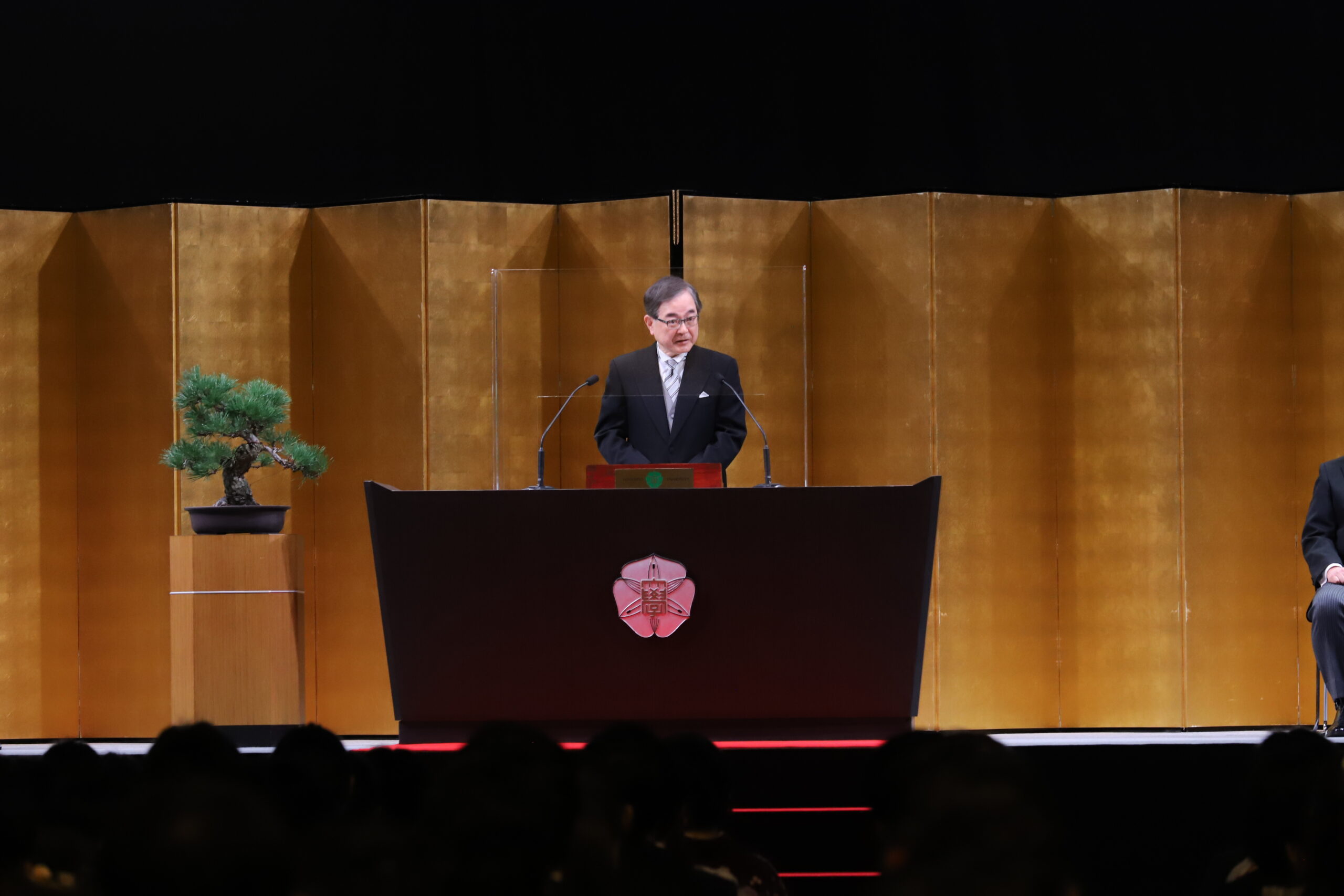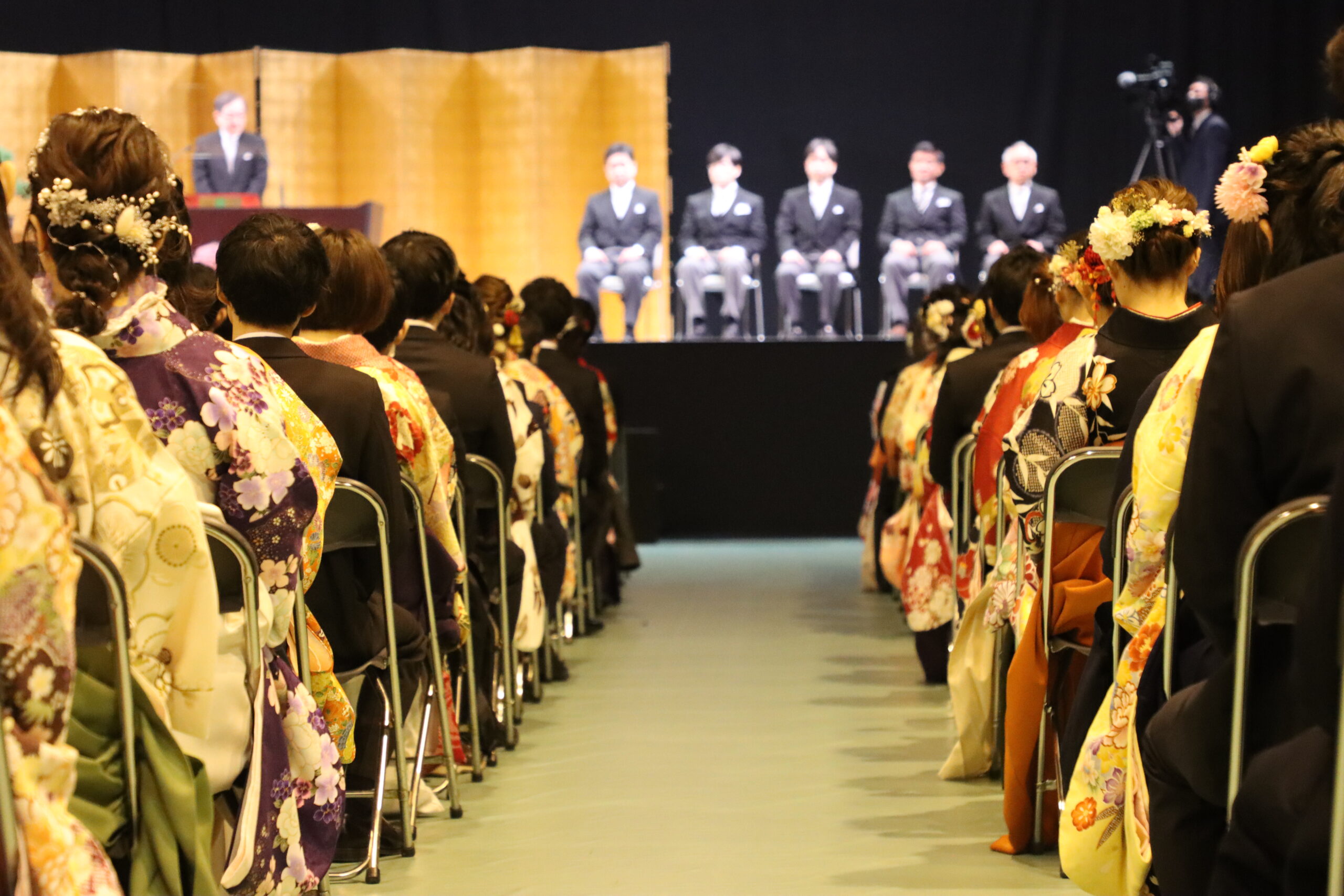Master’s, professional, and doctoral degree presentation ceremony: Farewell address
University News | March 23, 2023
On behalf of Hokkaido University, I would sincerely like to congratulate all of you upon achieving your master’s, professional, and doctoral degrees today.
I would also like to extend my congratulations and gratitude to your families, guardians, mentors, and all other people who have provided for you, supported you, and encouraged you to this day.
Today, we are proud to award 1,573 master’s degrees, 70 professional degrees, and 315 doctoral degrees. Each of you has devoted yourself to your study and research, gained expert knowledge, and achieved research excellence in your area of expertise.
I would also like to add that, of these, 241 master’s degrees, 9 professional degrees, and 97 doctoral degrees are being awarded to international students.
You have persevered in an unfamiliar environment where you study in English and live your daily life in Japanese. Your efforts and academic achievements are highly commendable and deserve the utmost respect.
I represent the faculty members who confer your degrees today. As a faculty member of Hokkaido University, I initially wanted to give you a brief lecture.
So today, in what will be my first and last lecture as your faculty, I would like to share three short messages with you.
The first is an apology. Due to the COVID-19 pandemic, we could not provide you with the learning environment that we had promised when you arrived at the university, four or six years ago. It is truly unfortunate that most of your time here coincided with the years of this pandemic. As a result, as in universities around the world, we faced great difficulties in education and research at graduate schools. Some fear that the decrease in face-to-face communication may have affected research.
However, I think we could look at this differently. My expertise is in the area of medicine and biology. When placed in harsh conditions, all living organisms, including humans, express genes that adjust to such conditions in order to survive. In this pandemic, you also have acquired strong abilities that you could not have in a more peaceful time, such as the ability to adapt to digital learning and instantaneous online connection to remote locations. I believe these are important competencies to survive the next era, The Great Reset.
My second message to you is that you must continue to “learn.” I am now 68 years old. In all likelihood, the time for learning I have left is shorter than yours. Yet, I still try to keep learning. Every day, for about an hour, I continue to study for myself.
Going forward, you have two choices for your life. One is a life that changes society and the world, and the other is a life that is at the mercy of a changing world.
It is clear where the difference are between these two. People who change the world for the better, even if only a little, are those who constantly learn and challenge themselves. Conversely, those who forget proactive learning and abandon challenges the moment they complete their degrees will remain at the mercy of the changing world.
Most importantly, the time given to us for these learning and challenges is remarkably short. To be more precise, our lifespan, biologically speaking, is not that short, but if we want to accomplish anything, perhaps life is never long enough.
It is well known that Katsushika Hokusai painted the stunning The Great Wave off Kanagawa, a part of the Thirty-six Views of Mount Fuji landscape print series, when he was about 70 years old. He passed away at the age of 90, and on his deathbed, he left words of regret, “If only I had another five years to live, I could have become a true painter.”
It is said that Zhu Xi stated, “Art is long, and life is short.” Confucius left words such as, “If I hear the way of truth in the morning, I am content even to die in the evening.” And Steve Jobs famously said, “Stay hungry, stay foolish.” There are many interpretations, but I believe that all of these are expressions by our predecessors who had an insatiable spirit for learning and mastered challenges, all speaking of their experiences in their own words.
The third and final topic of my lecture today is the life of Dr. William S. Clark, the first vice president of Hokkaido University. In my second message, I talked about how we should continue to learn and challenge ourselves. In this sense, our greatest role model is most certainly Dr. Clark. Even now, 150 years after the opening of the University, I think that Dr. Clark is still the best faculty member at Hokkaido University.
About 150 years ago, Dr. Clark held the high position of President of Massachusetts Agricultural College, near Boston, on the East Coast of the United States. He had previously served in the Union Army and fought in the Civil War while he was a professor at Amherst College. Then, in 1876, he accepted a request from the Meiji government of Japan, crossing the American continent and risking his life across the Pacific Ocean to come to desolate Sapporo, with 13 students who had studied English in Tokyo. The population at that time is not known exactly, but it is estimated to have been only about 2,000. By any measure, Dr. Clark’s choice was certainly a challenge beyond the imagination of ordinary people.
After accomplishing his mission of laying the foundation of Sapporo Agricultural College, the predecessor of Hokkaido University, he left Sapporo with a very simple and inspiring message: “Boys, be ambitious, like this old man!” After returning to the U.S., Dr. Clark started his own business, but he suffered from a series of unfortunate events and passed away at the age of 59.
These facts mean that his life itself was a challenge throughout his lifetime. It was not limited to academic and educational pursuits, but, as he himself said, a life of ambition to change the world and society through a series of brave endeavors, which were precisely entrepreneurship and startups in today’s terms.
After this ceremony, please stop by once again at the bust of Dr. Clark on the Central Lawn, the most well-known statue in Japan. And spend some time to reflect on his life of ambition and daring pursuits.
I thank you for listening to my very brief lecture. Finally, I would like to add that we now live in a time of great difficulties, with wars, infectious diseases, and climate change threatening our very planet. However, I urge you to keep learning, keep challenging yourselves, and be courageous and proud as you embark on your new journey that is about to begin.
I would like to conclude my remarks by wishing all of you great health and success in your future endeavors. Once again, congratulations!
The farewell address for the bachelor’s degree’s graduates can be found at the following link (in Japanese):
https://www.hokudai.ac.jp/president/greeting/11.html


